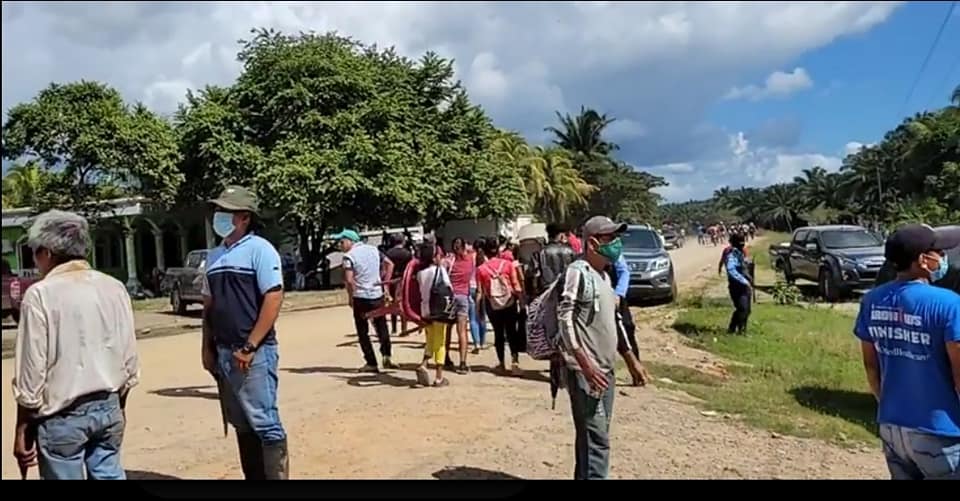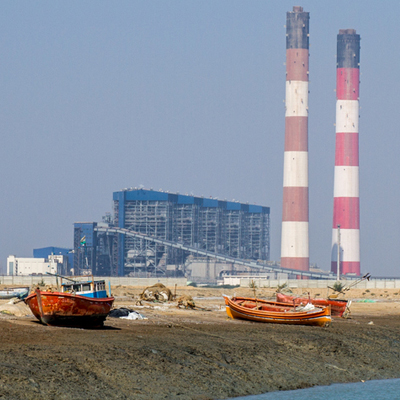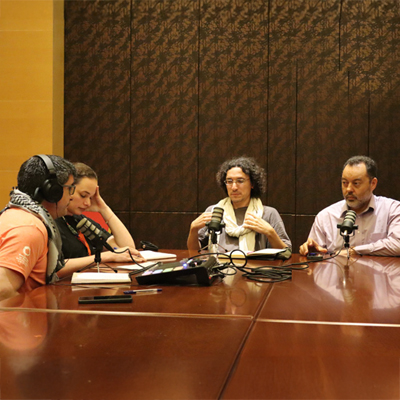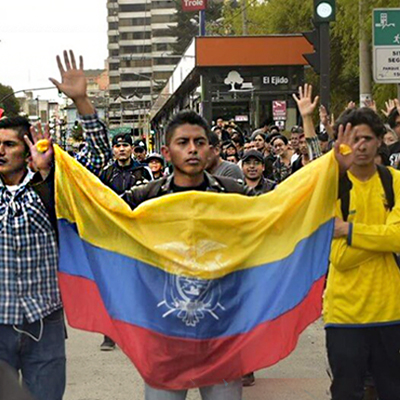Honduran peasants suffer violent evictions in Aguán
 Violent evictions in Aguán, December 21, 2021. Photo: Plataforma Agraria Facebook.
Violent evictions in Aguán, December 21, 2021. Photo: Plataforma Agraria Facebook.
Last year, between December 16 and December 21, various social and peasant organizations denounced the violent evictions that thousands of peasants were suffering in Aguán, Honduras. The situation was repeated a week later against members of the Cooperativa Remolino cooperative, who were evicted by private security guards and the COBRA squad who shot them with firearms, leaving at least 7 people injured, two of them minors. This was exposed by the Honduran platform Plataforma Agraria, in conjunction with COPA (Coordinadora de Organizaciones Populares del Aguán).
Yoni Rivas, a representative of Plataforma Agraria, said on Real World Radio that, on December 27, some 200 families that are part of Cooperativa Remolino “entered to recover lands from the Agrarian Reform”; lands that “the corporations have been usurping for more than 27 years,” he remarked.
“Although several of the attackers carrying R15 weapons were arrested, they were released hours later,” Rivas explained. Among the wounded, the one who remains in the worst medical condition is Carlos Alexis Torres, 17, who has a serious fracture in his left leg after being shot, and is still waiting for a surgery. Santos Rosales, who was shot in the stomach, was discharged from La Ceiba. The other five were shot with pellets — one of them being impacted with 68 shells — and all are already discharged.
“The evictions take place because we believe that there are judges and prosecutors who abuse their authority and issue eviction orders. This situation enables the police and security groups to obey these judges who are protecting the interests of landholding corporations of the Facusse, Morales and Canales families, who have monopolized almost 70% of the land in the Aguán Valley,” stated Rivas in RWR.
Cooperativa Remolino, made up of displaced families, is dedicated to the recovery of basic grains and the production of yucca, corn, oranges and other citrus fruits, as opposed to the implementation of palm monoculture. On January 5, a prosecutor reissued an eviction order, first denied by one judge and finally accepted by another, although without an execution date, “in a clear abuse of authority,” says Rivas, since members of the peasant cooperative presented the papers that demonstrate their ownership of these productive lands. In this scenario, one option is for the judicial authorities to enforce that order before the new government takes office; the expectation of Plataforma Agraria is that the eviction does not take place until then, and that the new President will listen to them and defend the peasant struggles.
The platform detailed that the violent eviction operation was in charge of the retired former colonel of the Honduran Armed Forces, Francis Reyes Contreras, who is the current head of Security of the company Inversiones Ceibeña, and that these events “occurred in front of the police, that did nothing to stop the attacks.” This is a new example of the collusion between former members of the armed forces and corporations that seek to develop extractive projects in peasant, indigenous and Garifuna territories, as it was proven in the trials for the femicide of Berta Cáceres. “The thing is that in this country we have been under a narco-dictatorship, which responds to the agribusiness corporations, just as the judges obey the same line and that is why they fraudulently issue evictions, ignoring the reality of the cooperatives,” Rivas said. “This situation leaves the defenders of Aguán vulnerable, failing to comply with the 126 precautionary measures that the IACHR issued to protect them,” added the peasant representative.
From Plataforma Agraria they denounced “attempted homicide, illegal carrying of weapons, and that an immediate and exhaustive investigation must be carried out on the profile of the security guards who are hiring agro-industrial companies such as Dinant, Inversiones Ceibeña and Agropalma, among others”, which permanently harass cooperatives and peasant organizations.
Last Sunday, armed groups sent by Dinant company attempted to violently evict the 180 families that make up the cooperative El Tranvío in the municipality of Tocoa, using 684 hectares of land. “Since the companies have no legitimacy, they use armed groups to cause terror and thus occupy the land,” said Rivas.
“Landowning corporations do not meet any requirement to be beneficiaries of these territories. That is why they bribed, threatened and, in many cases, murdered to the point of monopolizing the land and getting us involved in these conflicts. But we hope that with the arrival of Xiomara Castro to power we will be finally heard”, expressed the peasant representative at the end of the interview with RWR.






